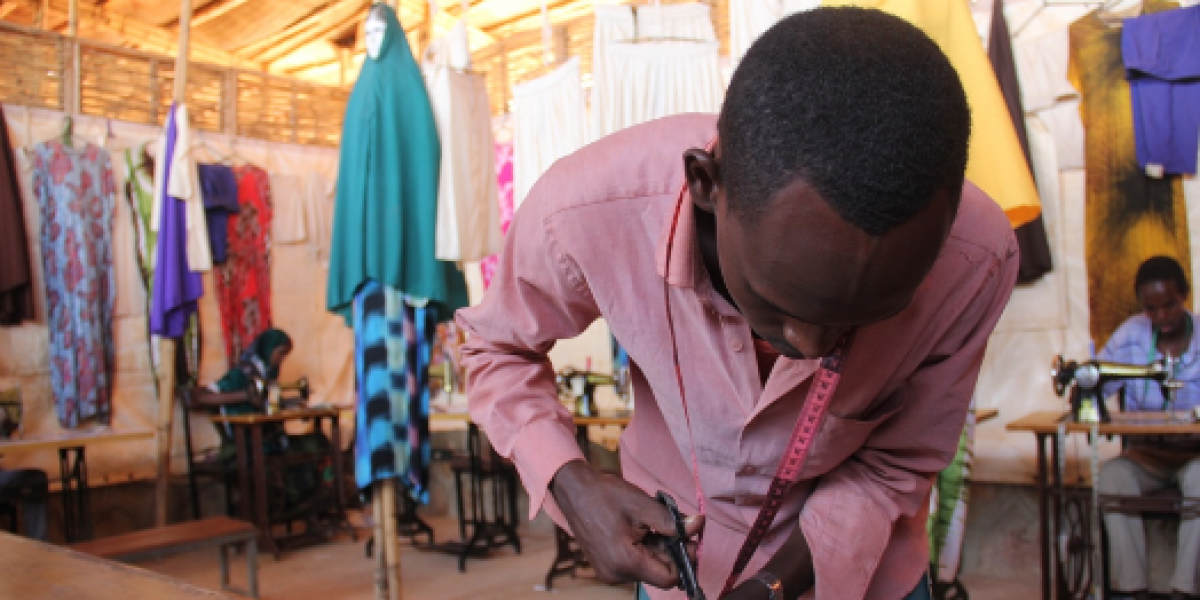Ethiopia: Education Promotes Self-Reliance
15 October 2018|Angela Wells

Kaadi Ali Ibrahim used to measure his assets in livestock – camels, cattle and goats – but his new home in Melkadida refugee camp does not offer much space to herd or trade animals. Those who flee must leave not only their homes, but their whole livelihoods behind.
As Kaadi and hundreds of thousands of other Somali refugees fled drought and conflict from 2009 to 2011 they journeyed through the desert – some for three months – to reach safety. Many of their animals – their sole source of income – died or were seized by armed groups along the way. Since then, they have been reliant on humanitarian agencies in five camps housing more than 200,000 refugees. “Most of us lived in the so-called bush in Somalia and lost everything to the drought. Our animals starved and we had to flee while those with businesses were protected from death,” said Kaadi.
“I was in grade five when (militants) came to our property and stole the land and all the livestock,” added Somali refugee, Ali Aden Nuur. Loss was followed by dreams for a new life, goals to learn new skills in order to provide for their families in different ways.
Learning After War
“We fled at first to find peace. Then we hoped for education. We’d never really studied, because classes were always disrupted by violence. Armed groups would chase away teachers. You can’t learn in a war,” said 19-year-old Aden Abdi Hussen, a recent graduate of the Jesuit Refugee Service tailoring course in Melkadida refugee camp. In Melkadida camp, JRS offers beginner and intermediate courses in employable skills for adults like Aden. Displaced Somalis learn technical skills in tailoring, henna tattooing, embroidery, male hair dressing and plumbing.
“The JRS training is the most school we’ve ever had,” said Kaadi who now studies in JRS vocational skills training courses which strive to provide students with the tools to become more self-sufficient and an opportunity to learn basic literacy and numeracy skills.
Preparing for the Future
The trainings also aim to prepare refugees for the day when the NGOs depart and they can return home, says the JRS teacher of the plumbing course who taught 77 people techniques in water management and tank repair last year. “They learn how to clean and purify water, so if they find themselves in an emergency, they’ll be prepared to care for their communities,” he said.
A few graduates of the course are employed by organizations managing water, sanitation and hygiene in the camp while others have secured jobs as plumbers after choosing to return home to Somalia. Students of the tailoring course are also using their skills to make a living. Mohamed Nour Mohamed, for example, opened his own shop after completing the tailoring course.
“I came here five years ago with no experience in tailoring, but I wanted to develop myself and build my future,” he said. He now rents a sewing machine and a shop in the market where he sells shirts, dresses and other garments. With his income he can provide for his three children and wife. He plans to expand his business by joining with a dozen or so other graduates in a cooperative for tailors.
“We want to have four cooperatives where people would share one shop, a sewing machine and some start-up materials. Graduates would work there and split the profits. Our first one has already started with making uniforms for plumbers,” said Mohamed. Becoming self-reliant. Vocational training for adults helps refugees sustain life in remote areas like southern Ethiopia where harsh climates make growing food difficult and food rations as well as jobs are limited.
“We aren’t handed everything here. Food rations aren’t enough to feed our families. We need money to buy extra food, clothes and pay school expenses. Life is more expensive here in the camp than in Somalia. We hope each person will be able to earn their own income eventually,” said Duale Ali Ibrahim, the eldest member of the tailoring cooperative.The youngest member of the cooperative, Ali Aden Nuur, is 19- years- old. He has completed three of the JRS trainings and hopes his ambition will bring him far.
“We’ve done plumbing, tailoring and barber school. We’re young and we want to do more than just survive here. This would be easier if we could get materials and a space in the market to manage our business. In the future, though, we really hope we can go abroad,” he said.



